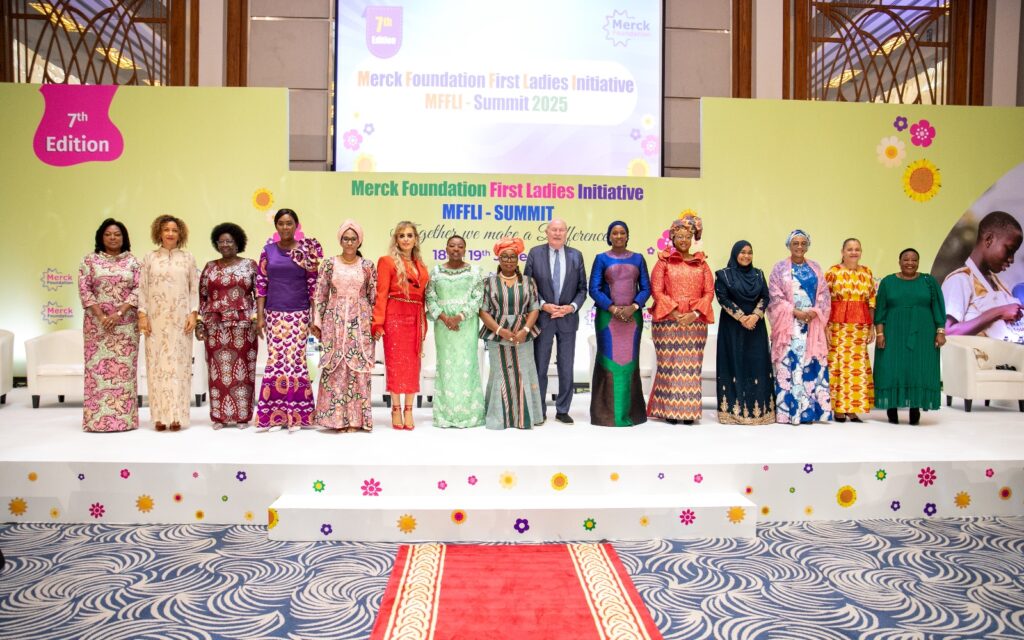
Kenya is currently grappling with a significant shortage of healthcare workers, particularly in rural and remote areas, where the lack of trained doctors, nurses, and specialists remains a critical challenge. This shortage continues to undermine the country’s efforts to achieve Universal Health Coverage (UHC) and deliver equitable, quality healthcare to all citizens.
However, through a strategic partnership with the Merck Foundation, Kenya’s healthcare system is receiving a much-needed boost.
The foundation is supporting the training of medical specialists to serve underserved communities, helping to bridge the workforce gap and expand access to essential health services.
Speaking during the seventh edition of the Merck Foundation First Ladies Initiative (MFFLI) Summit, Kenya’s First Lady, Rachel Ruto announced that the foundation has so far provided 244 scholarships to Kenyan doctors, with 50% awarded to female healthcare workers, a remarkable milestone in advancing women’s empowerment in the health sector.
As part of this ongoing collaboration, 100 Kenyan health professionals are currently being enrolled in a Postgraduate Diploma in Clinical Nutrition at the University of Buckingham in England.
“This is an extraordinary milestone that will leave a lasting impact on the quality and accessibility of healthcare across our nation,” the First Lady remarked.
She reaffirmed Kenya’s commitment to deepening its partnership with the Merck Foundation, not only to strengthen the country’s healthcare system but also to continue supporting patients from other African nations who seek specialised medical care in Kenya.
Beyond medical training, the Merck Foundation is also investing in education through its Educating Linda Program, which currently supports 47 underprivileged but high-performing girls, providing them with scholarships from secondary school through to college.
“I believe every girl in Kenya and across Africa deserves the opportunity to pursue her dreams and become the great professionals they envision,” said the First Lady.
She further lauded the foundation’s “More Than a Mother” campaign, a bold and multifaceted initiative aimed at empowering women and breaking the stigma surrounding infertility, especially in Africa and other developing regions.
The campaign promotes a cultural shift by raising awareness, training specialists, and supporting women beyond motherhood through economic empowerment.
Merck Foundation CEO, Senator Dr. Rasha Kelej, emphasised the importance of the First Ladies’ Annual Summit as a vital platform for sustaining momentum toward a shared goal of a healthier, more equitable world.
“These summits allow us to listen, learn, and build stronger partnerships that deliver real results, especially in remote areas long forgotten by traditional development models,” she said.
Since 2012, the Merck Foundation has awarded 2,520 scholarships in 44 critical medical specialities across 52 countries in Africa and South Asia. Additionally, it has provided approximately 1,000 scholarships to girls in partner countries, promoting gender equality through education.
Prof. Dr. Frank Stangenberg-Haverkamp, Chairman of the Merck Foundation Board of Trustees, cited a 2021 WHO report, which revealed that Africa bears 24% of the global disease burden but has only 2.91 healthcare workers per 1,000 people.
He highlighted that the problem is worsened by the unequal distribution of personnel between urban and rural areas and across the public and private sectors.
Reaffirming Kenya’s dedication to this impactful partnership, First Lady Rachel Ruto expressed optimism about the future: “Kenya looks forward to continuing its close collaboration with the Merck Foundation to achieve even greater impact and reach new transformative milestones together.”
She concluded with a powerful reminder of the value of service: “If you want happiness for a day, go fishing. If you want happiness for a year, inherit a fortune. But if you want happiness for a lifetime, help someone.”
The partnership between Kenya and the Merck Foundation exemplifies how strategic collaboration can drive meaningful change in health systems and communities. By investing in human capital, through healthcare training, women’s empowerment, and girls’ education, this initiative is not only addressing immediate gaps but also laying the foundation for a healthier, more inclusive future in Kenya and beyond.
